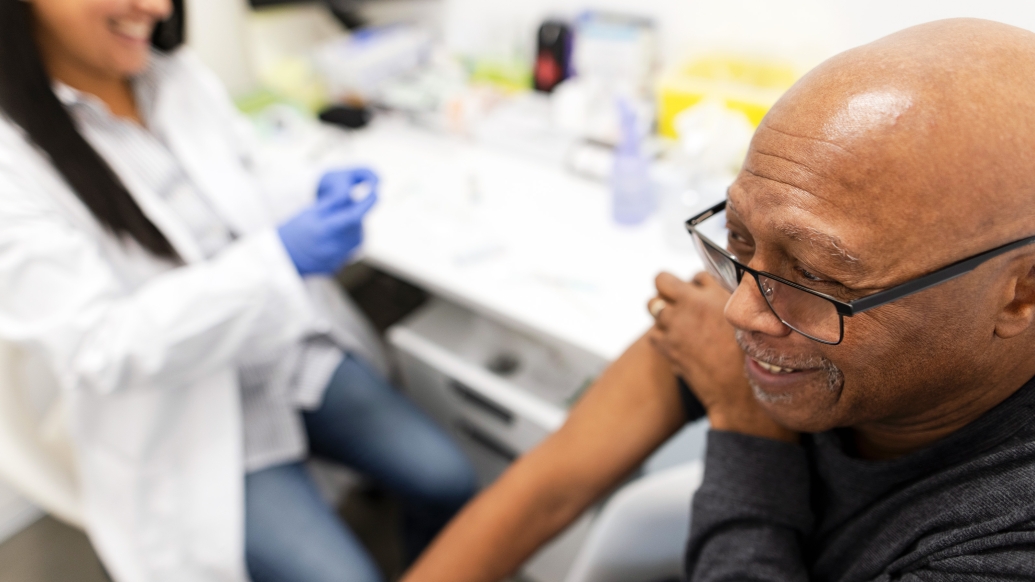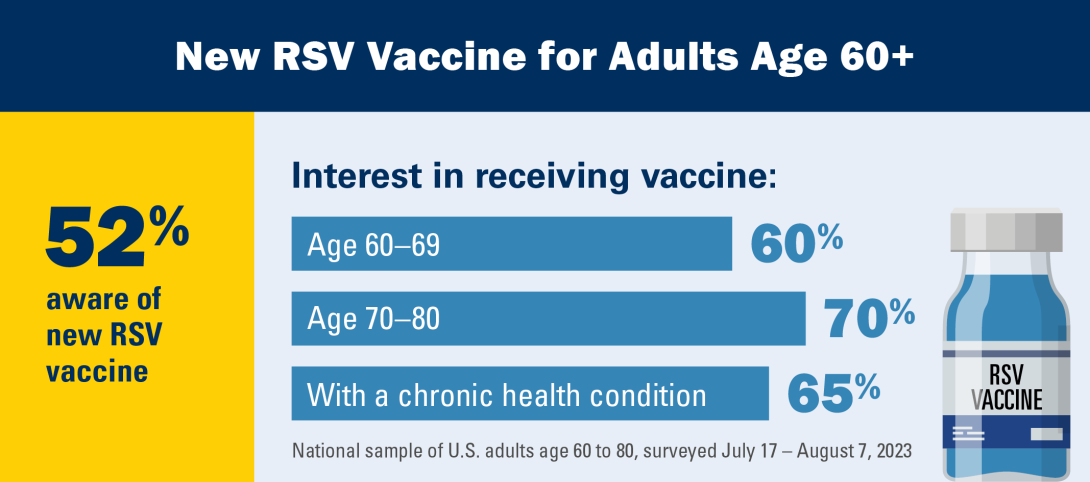But a survey reveals differences by age, gender, health status, levels of education and income when it comes to new vaccine awareness and interest among people age 60 to 80
11:07 AM
Author |

The first Americans over age 60 just started rolling up their sleeves to get vaccinated against respiratory syncytial virus, or RSV, now that brand-new vaccines have started to arrive at pharmacies and clinics.
Millions more older adults may do the same in coming weeks and months, a University of Michigan poll suggests, as they seek protection against the respiratory syncytial virus that is especially good at infecting older lungs.
But nearly half of older adults do not know about the new RSV vaccines that received approval earlier this year, the poll finds.
And some groups of older adults show much less interest in getting the RSV vaccine than others.
In all, 52% of people between the ages of 60 and 80 had heard the new vaccine option was coming, according to the new data from the National Poll on Healthy Aging gathered in July.
Asked how interested they are in getting vaccinated, 21% of those who answered said they’re very interested, and another 43% said they’re somewhat interested.
The virus poses the most danger to older adults who have lung, heart, kidney or immune system conditions, or diabetes, and those who live in nursing homes or other group settings.
As we prepare for the first RSV season when a vaccine will be available for older adults, these early data suggest a need for public health officials, primary care providers, pharmacies and others to target their outreach and awareness-building efforts."
- Preeti Malani, M.D.
But only 41% of older adults who say their health is fair or poor had heard of the RSV vaccine, compared with 53% of those who rated their health as good to excellent.
On the other hand, over 65% of those with a chronic health condition said they were very or somewhat interested in getting the vaccine, whether or not they had heard of it before being polled.
SEE ALSO: RSV: What parents should know
Risk from RSV infection rises with age, and so did interest in getting vaccinated against it.
In all, 70% of people in their 70s said they were very or somewhat interested in getting vaccinated, compared with 60% of those in their 60s.
“As we prepare for the first RSV season when a vaccine will be available for older adults, these early data suggest a need for public health officials, primary care providers, pharmacies and others to target their outreach and awareness-building efforts,” said Preeti Malani, M.D., senior advisor to the poll who has training in geriatrics as well as infectious disease and is a physician at Michigan Medicine, U-M’s academic medical center.
She added, “We found an association between awareness and interest, with 68% of those who had heard of the vaccine saying they were very interested or somewhat interested in getting vaccinated, compared with 60% who hadn’t heard of the vaccine until asked by the poll team.”
The poll is based at the U-M Institute for Healthcare Policy and Innovation, and supported by AARP and Michigan Medicine.
More about RSV
RSV infections of the lungs and airways send as many as 160,000 older adults to the hospital each year, and kill as many as 10,000 of them, at a cost of more than $1.3 billion a year.
That’s why the two new vaccines received approval from the U.S. Food and Drug Administration this spring after tests showed they reduce the risk of serious illness such as pneumonia.

It’s also why the Centers for Disease Control and Prevention officially recommended them for people over 60, in consultation with a health care provider.
SEE ALSO: An adjuvanted intranasal vaccine for COVID-19 protects both young and old mice
A University of Michigan team’s economic model helped inform the recommendation.
The CDC’s recommendation means that Medicare, Medicaid and most private health insurance plans will cover the entire cost of the vaccines for people over 60.
Malani notes that older adults who are regularly around children should be aware that RSV is commonly transmitted at daycares, schools, and in the home.
Infected children often have mild disease or no symptoms, though infants and preschool-aged children have a higher risk of serious illness and hospitalization than school-aged children.
A shot to prevent RSV for infants and young toddlers also recently received FDA approval and CDC recommendation.
More poll findings
- Gender: More women (57%) than men (46%) had heard of the RSV vaccine, but there was no significant gender difference in interest in being vaccinated.
- Education and income:
- Fifty-six percent of those with a bachelor’s degree or higher had heard of the vaccine, compared with 46% of those with some college or less. Meanwhile, 55% of those with annual household incomes over $60,000 had heard of the vaccine, versus 47% of those with incomes below that threshold.
- Those with a college degree (68%) and those in higher income households (66%) were more likely to say they are somewhat interested or very interested in getting an RSV vaccine than those with fewer years of education (58%) or in lower income households (60%)
- Race/ethnicity: There were no significant observed differences in vaccine awareness among those of different racial or ethnic backgrounds. But differences emerged when it came to interest in vaccination: 65% of White, non-Hispanic respondents said they were somewhat interested or very interested, compared with 56% of Black and 56% of Hispanic respondents.
The new data come from a poll administered July 17 through August 7 to 1,850 people aged 60 to 80 who answered the question about awareness of the RSV vaccine;1,817 of them also answered the question about interest in receiving it. The poll methodology is described here.
Get more information about the National Poll on Healthy Aging, including past reports on COVID and influenza vaccination among older adults.

Explore a variety of health care news & stories by visiting the Health Lab home page for more articles.

Department of Communication at Michigan Medicine
Want top health & research news weekly? Sign up for Health Lab’s newsletters today!





